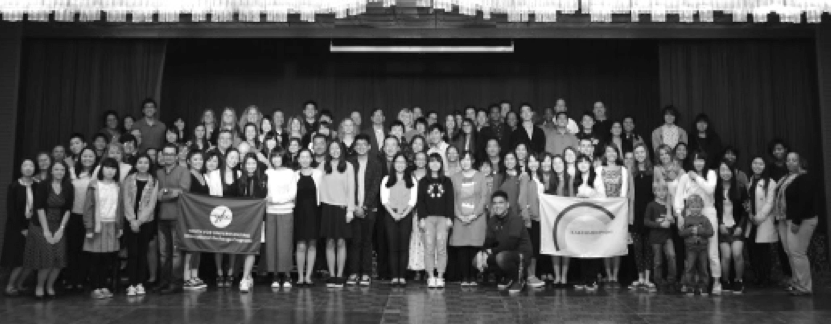From February 2 through the 4, some of Poly’s own got a chance to host students from Akita, Japan, and got the opportunity to expose the exchange students to the campus and southern California. During their journey, they got a glimpse into the best, and the worst, of American culture, experiencing everything from Hollywood to Disneyland. A whopping twenty-three Japanese students, along with two chaperones, accompanied a select handful of Poly students around.
During this past summer, Poly students went to Japan, along with Christine Tram and Susan Watson, to visit the same students at their high school, Akita Minami. This unique exchange program is made possible by Kake Hashi (Japanese for building bridges), an organization that is aiming to form a bond between Japan and the United States by allowing youth of both nations to better understand each other’s culture. “Well, taking my students to Japan benefits my class because they get to actually use their Japanese in a real life situation, and they got to see all the stuff they learned in class. I wasn’t making up Japanese, I was teaching them real words,” said Watson with a reminiscent smile.
Can you imagine going to school for six days a week in a suit and tie, or a blazer and pleated skirt? That’s what daily life is like for a high school student in Japan. They uphold a professional appearance to keep up with their world renowned academic reputation. But, can you imagine not being able to show public displays of affection to your significant other? These sort of regulations are commonplace in a Japanese high school, so you can imagine their surprise when they came to Poly with couples snogging at every corner and fashion choices from ponchos and bell bottoms to flip flops and crop tops. Akita is covered in nearly three feet of snow right now, adding to the cultural distinction.
However, there are a few aspects of the culture that American students can relate to. Around this time of year, Japanese students are anxiously going through the process of pursuing a higher education in college. In America, we have numerous chances of getting a good enough SAT score to impress the colleges of our choice. In Japan, however, they have one shot. They go to said institution, take the test, and wait at the edge of their seats for results. Though this may seem inconceivable, Japanese students grew up with this healthy, competitive attitude towards their education, and consider anything else to be foreign. “It inspires me to just work hard and be grateful that I live in America, a country where, just like college, you have multiple opportunities to be successful,” said senior Tatiana Tate, as she recalls the difficulties Japanese students have to face.
Both Japanese and American students alike got an enriching experience from the exchange. Exposing the exchange students to American culture may have been rewarding by way of freedom of expression through clothing and physical contact with other humans, but could also remind them of their academic advantage from being in such a cultivating environment. American students, on the other hand, would jubilantly return to their five-day school weeks and multiple opportunities to achieve success in their scholastic endeavours. However, the slight division between the two is the very foundation of the bridges being built through the Kake Hashi program. The experiences it provide to students from both sides of the world are unforgettable, and emphasize the importance of blending cultures in order to improve global relationships. “No matter where you are from around the word, you typically have similar morals and similar hobbies,” said senior Kayla Sanders.
Future exchange opportunities in the Poly Japanese language department include partnerships with Long Beach’s sister city, Yokkaichi, that extend beyond surface level explorations. On July 20, 2017, two students and one teacher from each city will be sent on a three week trip to Japan to act as goodwill ambassadors. On July 31, four students and one teacher will embark on an eight day environmental summit, learning about innovative ways Yokkaichi is helping the planet become more environmentally friendly. Application deadline for both of these opportunities are on Friday, February 24.


Leave a Reply